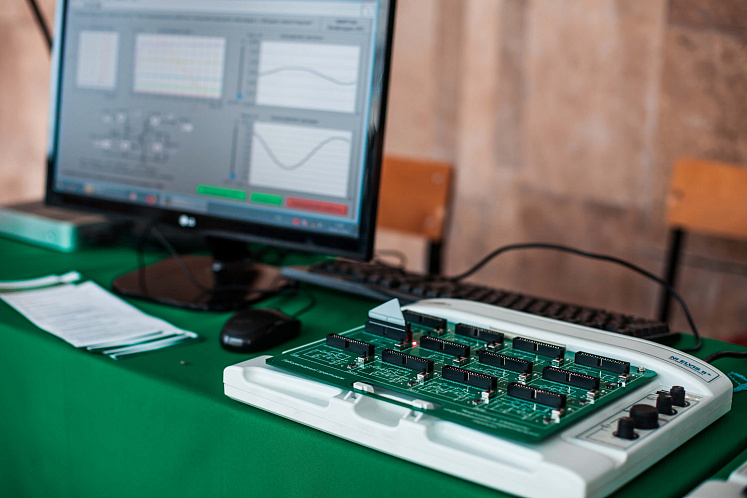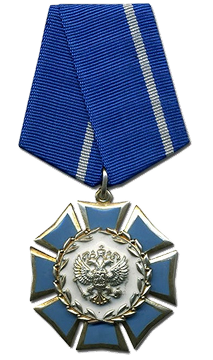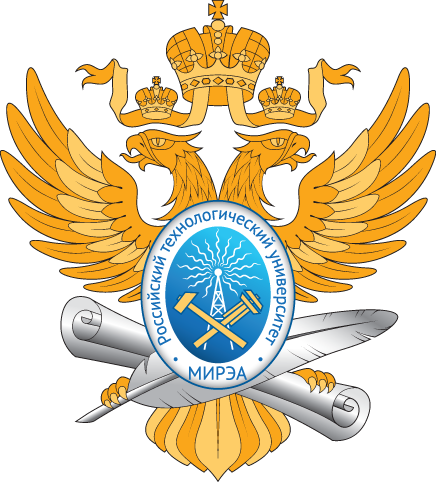About the Institute
Institute of Artificial Intelligence
About the Institute
The Institute of Artificial Intelligence is a structural division of MIREA – Russian Technological University, which, as part of training in specialist, bachelor's and master's programs, trains specialists in the research, development and implementation of artificial intelligence technologies in modeling, management, processing and information security, including such scientific areas as computer science, applied mathematics, computer technology, automation of technological processes and production, mechatronics and robotics, control in technical systems, system analysis and management, information and computer security, biotechnical systems and technologies, medical physics.
«Regulations on the Institute of Artificial Intelligence»
«Regulations on the Institute of Artificial Intelligence»
Training programs:
-
Bachelor's Degree Programs
-
Master's Degree Programs

Work experience
The Institute of Cybernetics was founded back in 1969. In the course of its existence and successful work, it has achieved leading positions in training specialists for major knowledge-intensive industries in the real sector of the economy, federal services and departments, as well as research organizations and centers for innovative development. According to the robo-hunter.com portal, the Institute ranks first among universities teaching robotics.

The Institute’s own developments
Every year, the Institute implements several dozen high-tech research and development projects, in the implementation of which not only researchers and the teaching staff are involved, but also undergraduate and graduate students, specialists and post-graduate students. Students participate in the creation of autonomous mobile robots, 3D scanners and 3D printers, CNC machines, the development of models of information support for the life cycle of complex engineering products, as well as the installation and commissioning of new educational and scientific laboratories and centers. In close cooperation with industrial enterprises and research institutions, the Institute of Cybernetics contributes to the development of the aviation, rocket and space industries, biocybernetics technologies and information security. The established Training Center “Industry 4.0: Digital Robotic Manufacturing” has opened up new opportunities in training highly qualified specialists for the implementation of the State Program “Digital Economy of the Russian Federation”

Advanced training
Mathematics at the Institute is taught in a volume no less than at the Faculty of Computational Mathematics and Cybernetics of Moscow State University named after M.V. Lomonosov. A significant part of the disciplines on control theory, system analysis, and life cycle management of complex systems is taught by prominent scholars in systems engineering and management. Leading medical specialists provide training in radiological methods for diagnosing and treating cancer. Practical classes and laboratory workshops are conducted in laboratories with modern equipment and software products. Training sessions are integrated into research activities. Professional competencies related to future production activities are acquired by students at enterprises that are strategic partners of the Institute of Cybernetics. As part of academic mobility, students are given the opportunity to study under a double degree program in leading educational institutions in France, Germany and Italy, as well as undergo internships in educational and research centers in Europe and Asia. Final qualifying works are carried out under the supervision of experienced experts from among the teaching staff of RTU MIREA, leading specialists from industry and research centers.

Practice-oriented training
Students gain skills in working with design documentation, modern industrial equipment and software, master technological processes that are used at basic enterprises: JSC “Concern Avtomatika”, Federal State Unitary Enterprise “Research and Production Center for Automation and Instrumentation named after Academician N.A. Pilyugin” (NPTsAP), JSC “Concern Vega”, JSC Research and Production Corporation “Space Monitoring Systems, Information Control and Electromechanical Complexes” named after A.G. Iosifyan (“VNIIEM Corporation”), JSC Concern “International Air Navigation Systems”, FSUE “State Scientific Research Institute of Aviation Systems” (“GosNIIAS”), Institute of Radio Engineering and Electronics named after V. A. Kotelnikov (RAS), and at other enterprises - strategic partners of the Institute of Cybernetics. The overwhelming majority of students' final qualification works have an applied focus and concentrate on implementation in industry. Laboratory stands created by students are actively used in the educational process.

Professions of the future
Cybernetics is the science of multi-criteria information processing and control in technical, biological and economic systems. All areas of training and specialties at the Institute of Cybernetics are related to solving problems of digitalization of the economy. At the Institute, one can get a profession that will certainly be in demand due to the rapid development of the Internet of Things technologies, mechatronics and robotics, information management systems and complexes, automated process control systems, life cycle support systems for complex engineering products, biocybernetics, and information security. Students receive good mathematical training, which allows them to create mathematical models and control algorithms for complex dynamic objects, have knowledge and skills in programming for their implementation on computers, and can carry out an integrated, coordinated use of system, architectural and design approaches when solving problems of the development of digital production. Graduates hold positions as developers of complex technical, information and software systems, system integrators, information security specialists in computers and telecommunication networks, design engineers of circuit and robotic systems, system analysts and software environment developers in large Russian and international companies, as well as in government structures.
Qualified teaching staff
The Institute has an impressive personnel potential: 82% of lecturers and instructors have academic degrees and titles, 24% of them have Doctor of Science degrees and professorships. The scholars and the teaching staff of the Institute regularly publish the results of their research in monographs and scientific articles, including those indexed by the Web of Science, Scopus, Higher Attestation Commission and RSCI databases. Much attention is paid to the publication of textbooks and teaching aids. Approbation of scientific and practical results of research carried out by lecturers, instructors, researchers and students is carried out at Russian and international scientific conferences, symposia and seminars.
- Educational Activity
-
Institutes
- Institute of Information Technologies
-
Institute of Artificial Intelligence
- About the Institute
- Institute Administration
- History of the Institute
-
Training programs
- Bachelor's Degree Programs
-
Master's Degree Programs
- 01.04.02 Applied mathematics and information science
- 09.04.01. Informatics and computer engineering
- 12.04.04 Biotechnical systems and technologies
- 15.04.04 Automation of technological processes and production
- 15.04.06 Mechatronics and robotics
- 27.04.03 System analysis and management
- 27.04.04 Engineering system control
- Infrastructure
- Alumni
- Contacts
- Institute for Cybersecurity and Digital Technologies
-
Institute for Advanced Technologies and Industrial Programming
- About the Institute
- Institute Administration
- History of the Institute
-
Training programs
-
Bachelor's Degree Programs
- 09.03.02 Information systems and technologies
- 11.03.04 Electronics and nanoelectronics
- 12.03.05 Laser technology and laser techniques
- 15.03.01 Mechanical engineering
- 22.03.01 Materials science and technology
- 27.03.01 Standardization and metrology
- 28.03.01 Nanotechnology and microsystems engineering
- 29.03.04 Decorative material working techniques
- 54.03.01 Graphic design
-
Master's Degree Programs
- 09.04.02. Information systems and technologies
- 11.04.04 Electronics and nanoelectronics
- 12.04.02 Optical engineering
- 15.04.01 Mechanical engineering
- 22.04.01 Materials science and technology
- 27.04.01 Standardization and metrology
- 29.04.04 Decorative material working techniques
- 54.04.01 Graphic design
-
Bachelor's Degree Programs
- Infrastructure
- Alumni
- Contacts
- Institute of Radio Electronics and Informatics
- Institute of Management Technologies
- Lomonosov Institute of Fine Chemical Technologies
- Institute of International Education
-
Mega-Laboratories
- Motion Capture Laboratory
- Immersive Technologies Laboratory
- Laboratory for the Development and Transfer of Microfluidic Technologies (DTMT)
- Cell Technologies Megalaboratory operating on the basis of the Department of Chemistry and Technology of Biologically Active Compounds, Medical and Organic Chemistry named after N.A. Preobrazhensky
- General Biotechnology Megalaboratory
- Industry 4.0: Digital Robotized Production center
- Laboratory of Intelligent Autonomous and Multi-Agent Robotic Systems
- Research and Educational Center for Biosynthesis, Isolation and Purification of Monoclonal Antibodies (Generium)
- Rare and Precious Metals Research and Technological Center operating on the basis of the Department of Chemistry and Technology of Rare Elements named after K.A. Bolshakov
- Laboratory of Analytic, Modeling, Design and Digital Prototyping Technologies
- Import Substitution of Information Technologies Educational and scientific testing complex
- Smart Production Systems Educational and Scientific Center
- Elastomers. Thermoplastics. Technologies Educational and Research Center operating on the basis of the Department of Chemistry and Technology of Elastomer Processing named after F.F. Koshelev
- Catalytic and Mass Exchange Processes center
- Center of Innovative Technologies in Microelectronics
- Center for Cybersports Robotics
- Mobile Robotics University Laboratory
- Radio electronic Technologies Megalaboratory
- Departmental Situation Center of the Ministry of Science and Higher Education of the Russian Federation for monitoring the sphere of education and science
- Scientific and Educational Center for Medical Radiology and Dosimetry
- Laboratory of Geographic Information Systems and Technologies
- Educational and Research Center for Space Monitoring ("CosMoCenter")
- Additive Polymer Technologies Center
- Cyber Threat Research Megalaboratory
- Digital Center of Rosatom State Corporation
- Laser Technologies Megalaboratory
- Mathematical Modeling and Artificial Intelligence Megalaboratory
- Megalaboratory of Digital and Additive Technologies in Mechanical Engineering
- Nanomaterials and Nanostructures Diagnostics Center
- Techno-coworking
- TESLA Educational and Research Center
- Bachelor's Degree Programs
- Master's Degree Programs
- Additional Education Programs
- Physical Education and Sports
© 2026 MIREA - Russian Technological University




